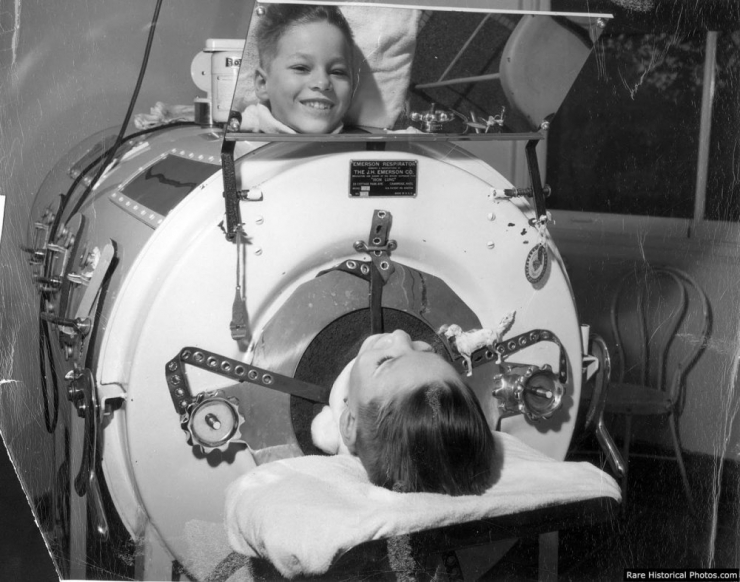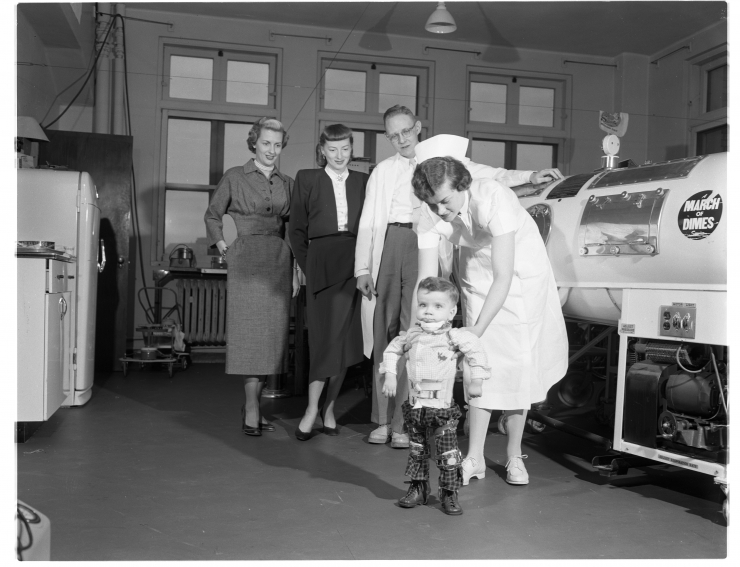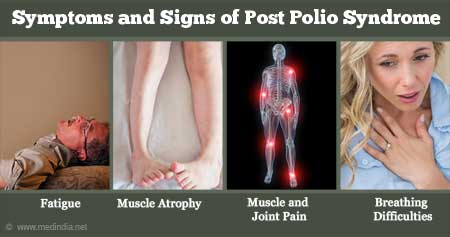
Han bets the odds that he can lose the enemy fighters within an asteroid field, despite being told by C-3P0 that it’s statistically unlikely. His response is simple: “Never tell me the odds.”
(Spoiler: He makes it.)

Like Han, beating the odds has been a central theme in Bruce F.’s life. In 1953, he contracted polio, a disabling and life-threatening disease caused by the poliovirus. The virus spreads from person to person and can infect the spinal cord, causing paralysis.

That was the case for Bruce, just a baby at the time, who spent the first three months after contracting polio paralyzed from the neck down. The next six months were spent in an iron lung.

During the polio outbreak, physicians saw that many patients were unable to breathe when the virus’s action paralyzed muscle groups in the chest. Death was frequent at this stage, but those who survived usually recovered much or almost all of their former strength.
Nothing really worked well in keeping people breathing until 1927, when Philip Drinker and Louis Agassiz Shaw at Harvard University devised a version of a tank respirator that could maintain respiration artificially until a person could breathe independently.
The machine was powered by an electric motor with two vacuum cleaners. The pump changed the pressure inside a rectangular, airtight metal box, pulling air in and out of the lungs.

It saved a lot of lives, but it’s hard to imagine what that had to be like, especially for babies and young children like Bruce.
It’s hard enough to be down and out on the couch with the flu for a week or two, let alone six months or more spent lying in a pressurized tank.

Eventually, Bruce regained movement and was mostly impacted from the waist down. He used crutches and braces for another year and slowly regained his life.
“As time and treatment progressed, I did, in fact, recover sufficiently to live a near-normal life as possible during the 50s and 60s,” Bruce told us. “I was even drafted at #107 for Vietnam, but obviously, couldn’t go.”

Bruce built a great life for himself despite those early challenges, getting married and having three daughters and a son. That, in itself, was another instance of beating the odds.

“Doctors told me I’d never have kids,” said Bruce. “I then had twin girls,” he laughed.

He had always dreamed of being a police officer but wasn’t able to with his mobility challenges, so he became a bank fraud investigator instead. He was good, really good. And during those working years, he never sought assistance from any organization for leg braces, shoes, or anything else he needed – and he was proud of that.

He also volunteered as a driver for a school of children with special needs and shared a heartwarming story with us:
“There was a student refusing to wear his leg braces. He didn’t want to do it. So I turned around in my seat to face him and lifted my pant leg, saying, ‘I’m wearing mine, so you have to wear yours.’ He wore them every day after that,” Bruce recalled.
“It hasn’t always been easy, but I don’t let this hindrance (as I call it) get me down. It’s not the end of the world,” he continued.

Unfortunately, the odds weren’t in Bruce’s favor. While he had already overcome so much, he was diagnosed with Post-polio syndrome, a disorder of the nerves and muscles that appears decades after the initial polio illness.
The resulting muscle weakness and pain ended Bruce’s career, and by 2007, the symptoms reached a point where he could no longer walk without extreme difficulties and significant pain.
“Since then, my symptoms increase each year to the point that walking more than 20 feet or standing for 5 of 6 minutes is painful and leads to falls,” Bruce said.

After working with his doctor, Bruce researched varied mobility equipment that best suits his needs and will help him maintain his independence. For the first time throughout his medical journey, he knew he needed to ask for some help.
Bruce reached out to Chive Charities to request some support in funding a Zinger power chair, electric carrier, adaptive living chair, and a tow bar. In total, it added up to $9,391. Donors like you made it possible, covering the cost in full. (Become one of them HERE.)
“I’ve always had this attitude of ‘don’t challenge me,’” Bruce said. “If you challenge me, I’m going to do it.”

His biggest challenge of maintaining his independence was on the line, and Bruce was willing to do whatever it took to keep his freedom – even if that meant asking for help.
To all those monthly and one-time donors who made that possible, we can’t thank you enough. Odds are, many more rare medical, Veteran, first responder, and military families will need help of their own. We have a feeling we know just the community of supporters who will be there for them. Are you up to the challenge? DONATE HERE.